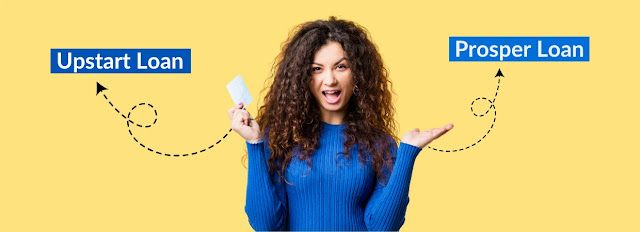Upstart vs Prosper Personal Loans
When you're in need of a personal loan, choosing the right lender can make a big difference not just in terms of interest rates, but also in the borrowing experience. Two popular online lending platforms that often come up in comparison are Upstart and Prosper. Both provide access to personal loans for various purposes like debt consolidation, home improvement, or medical expenses, but they differ in how they evaluate borrowers, the loan terms they offer, and the application process.
In this blog, we’ll do a side-by-side comparison of Upstart vs Prosper personal loans, breaking down their features, pros and cons, and which might be the better fit depending on your financial situation.
1. Overview of Upstart and Prosper
Upstart:
Launched in 2012, Upstart is an AI-driven lending platform that partners with banks and credit unions to offer personal loans. What sets Upstart apart is its use of non-traditional data, such as education and job history, to assess creditworthiness.
Prosper:
Founded in 2005, Prosper is a peer-to-peer lending marketplace. Instead of borrowing directly from a bank or credit union, Prosper connects borrowers with individual investors who fund the loans.
2. Loan Amounts and Terms
3. Eligibility Requirements
Upstart:
-
Minimum Credit Score: 300 (ideal for thin/no credit borrowers)
-
Minimum Income: $12,000/year
-
Debt-to-Income Ratio: Typically under 45%
-
Other Considerations: Education, employment history, and job potential
Prosper:
-
Minimum Credit Score: 640
-
Minimum Income: Not publicly stated, but steady income is required
-
Debt-to-Income Ratio: Below 50% preferred
-
Other Considerations: Credit history, current accounts, delinquencies
Verdict: Upstart is more flexible and ideal for borrowers with limited or poor credit. Prosper requires stronger credit profiles but may suit those with a more traditional credit history.
4. Interest Rates and Fees
Verdict: Upstart may offer slightly lower starting APRs and a wider range for origination fees. However, borrowers with excellent credit may get better average rates from Prosper.
5. Application and Approval Process
Upstart:
-
Prequalification available with a soft credit pull
-
AI-based algorithm considers education, major, and job offers
-
Fast approval and disbursement (often next-day funding)
Prosper:
-
Also offers soft credit pull for prequalification
-
Loan funded by investors, which may take longer
-
Transparent loan listing process before full funding
Verdict: Upstart wins for speed and innovation, while Prosper takes a more traditional route that can feel slower but more human-centered.
6. Customer Experience and Reputation
Upstart:
-
A+ rating from the BBB
-
Known for transparency and fast turnaround
-
Users appreciate the easy application process
Prosper:
-
A+ rating from the BBB
-
Has helped over 1 million people borrow since launch
-
Some delays may occur due to the peer-to-peer funding model
Verdict: Both platforms are reputable, but Upstart is often praised for being more user-friendly and quick.
7. Pros and Cons Summary
Upstart Pros:
-
Accepts borrowers with limited or no credit history
-
Fast funding often within 24 hours
-
Considers education and employment history
Upstart Cons:
-
High origination fees possible (up to 12%)
-
Limited to 3- and 5-year terms
Prosper Pros:
-
Peer-to-peer model gives borrowers more visibility
-
Competitive rates for good credit borrowers
-
Reasonable origination fees
Prosper Cons:
-
Requires higher credit score (640+)
-
Slower funding process due to investor matching
8. Which One Should You Choose?
Choose Upstart if:
-
You have a limited credit history or a score below 640
-
You want fast approval and funding
-
You have a solid educational or employment background
Choose Prosper if:
-
You have a credit score of 640 or higher
-
You don’t mind waiting a few extra days for funding
-
You prefer working with a peer-to-peer model
Ultimately, the better platform depends on your individual financial profile and priorities. If speed and flexibility matter more, Upstart is your best bet. If you want potentially lower fees and a more personalized investor experience, go with Prosper.
Final Thoughts
Both Upstart and Prosper offer legitimate, reliable personal loans but they cater to slightly different types of borrowers. Upstart shines in innovation, speed, and flexibility, making it a great option for people with non-traditional credit backgrounds. Prosper, with its peer-to-peer approach, is ideal for borrowers with stronger credit who are looking for a community-driven loan option.
Before making your decision, compare personalized offers from both platforms. Use the prequalification tools to see your potential rates without affecting your credit score, and always read the fine print regarding fees and repayment terms.




Comments
Post a Comment